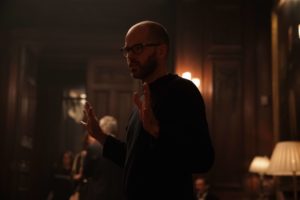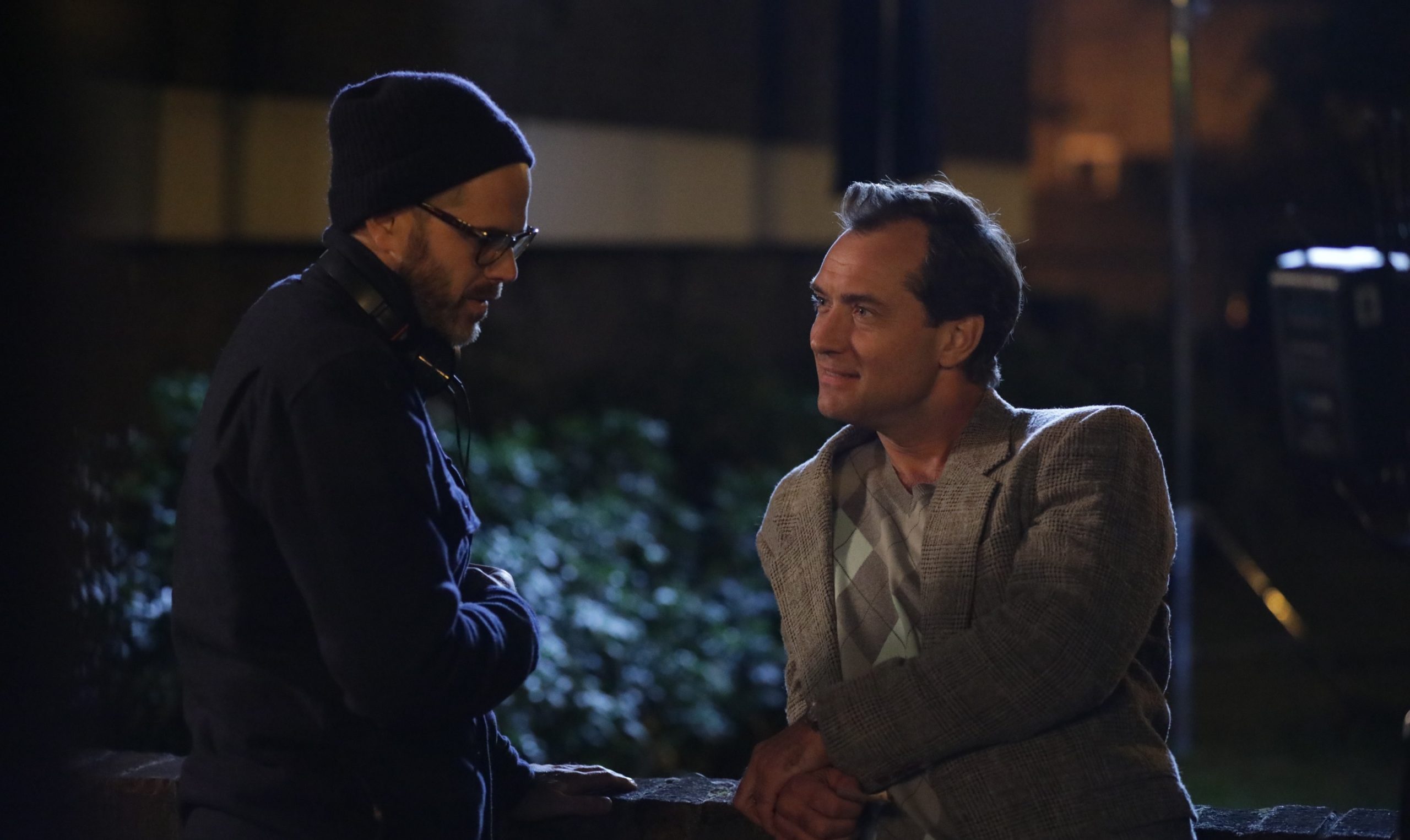Sean Durkin sits below a rectangular stained glass window of rolling hills in his small cottage in Santa Monica. It changes colors based on the time of day. He talks about his LA home, which is the size of a New York apartment, and his previous garden flat in London with almost childlike excitement. He’ll trade the qualities of age and quaintness for space, size, and money. For that reason and others, he’ll never be a director-for-hire.
Durkin’s previous feature was his first: 2011’s Martha Marcy May Marlene was a box office and critical success that launched the career of Elizabeth Olsen, as well as Durkin’s own. It came from an obsession with the Manson murders, his fear of home invasion, and his deep dive into cults and the lifelong consequences associated with them. For most, though, his name hasn’t been heard for the better part of the decade. “I’ll never be able to do something that I don’t give every ounce of myself to,” he explains. “When I do something, I have to fully, and that just takes a long time. But at the same time, I’ve had some really shitty luck.” His newest venture—The Nest, starring Jude Law and Carrie Coon—is more than four years in the making, with the script mirroring his own childhood.
As a sophomore effort, The Nest follows in the footsteps of his first feature, focusing on close, familial relationships. Law and Coon represent two sides of a marriage feigning to exist on solid ground, with both actors giving masterful performances that seem to only grow in complexity. Set off by a move from New York to a spacious yet empty home outside of London, the couple’s interactions with one another, with their two children, and with the outside world become the focus of The Nest, building in an unsettling fashion. The film shifts perspective as the story progresses, offering a glimpse into these people’s lives, the kind of people who act rich without the money needed to fulfill those fantasies.
Leading up to the feature, Durkin worked on an ill-fated Janis Joplin project for seven years. He directed the Channel 4 drama miniseries Southcliffe, which “fucked him up.” He collaborated with Sharon Van Etten, whom he met through Mike Birbiglia, for her music video “Your Love Is Killing Me” in 2014. He produced Dave Franco’s The Rental after the first-time director sent him the script and asked for advice, claiming to be a big fan of Martha. He even almost directed a Little House on the Prairie film adaptation and another TV show, but both fell through. Durkin knows many people in the film, music, and comedy scenes, but he’s never name-dropping or telling these stories out of a sense of self-importance. “I have a quiet life,” he says.
“I’ll never be able to do something that I don’t give every ounce of myself to. When I do something, I have to fully, and that just takes a long time. But at the same time, I’ve had some really shitty luck.”
Durkin isn’t on social media. He hates being on camera, and laughs at the idea of putting himself into his own films, even in a cameo role. Our call was the first time he’d used his camera on Zoom, though he uses FaceTime for a select few people in his life. He isn’t disconnected from the world around him—he only interacts with it on his own terms and on his own time, instead remaining focused on his wife and four-year-old daughter. Durkin’s days are surrounded by activities like taking his daughter to the park, walking his Jack Russell Terrier, Aggie, and working on several scripts at a time.
The Nest script accompanied him through the biggest changes of his life, dating back to February 2014 when Durkin was sleeping on the couch of his collaborator, co-producer, and good friend Antonio Campos’s couch. He had just gotten divorced, and packed his life into a duffle bag in anticipation of a flight back to England, one of his childhood homes. When he arrived in the U.K., he started writing the script and going to therapy for the first time. “Basically, I built my life back up over the next few years. I had a baby. I got remarried. I went through so much that it all fed [into the script]. It started as a reflection on childhood, but became a reflection on adulthood and its definition of success.”

Much of Durkin’s career rests on his time at NYU, where he met Campos and Josh Mond, the three of them forming Borderline Films with the simple mission of directing their first features. He learned under independent filmmaking royalty in Kelly Reichardt, even attempting to produce her feature Old Joy. At Cannes in 2008, she pushed Durkin to draw in his notebook and explore other types of art. “We were there with Afterschool which I produced for Tony [Campos] and she was there with Wendy and Lucy, and we were both in the Un Certain Regard [category]. She came over to me and goes, ‘What about your film?’ I said I produced this film, but she asked, ‘Are you still making films, because you should be. You need to be.’ She’s basically saying to not get caught up in producing. It was just such a firm nudge, you know?”
The Nest recently received its first nominations of the upcoming awards season with Carrie Coon and Law being recognized by the Gotham Awards in the Best Actress and Best Actor categories. “It’s great news to wake up to,” Durkin says. “I’m happy that it’s Jude and Carrie together, both being recognized together and separately. This film is like a heavyweight fight between them. It’s just nice to be recognized. It’s kind of that simple. The work itself is all that matters. But these things that follow are really important to giving the film life.”
Durkin values others’ opinions, though, regardless of his lack of affinity toward awards season. He likes interacting with the community, audience members, and other filmmakers, though it leaves room for nasty comments that tend to stick with him. He asks me what I thought of The Nest, and what instincts I had for who the story belongs to. These questions feel relayed with genuine interest—he takes feedback and criticism with a bit of personal strain and potency.
“Kelly Reichardt came over to me and goes, ‘What about your film?’ I said I produced this film, but she asked, ‘Are you still making films, because you should be. You need to be.’”
Coupled with his stringent examination of his own work, awards season burns Durkin out. “I think the more good movies there are, the better, because it means there is a bigger appetite for more movies,” he says. “And I just love movies, and I love filmmakers, and I love watching what other people do. But once we’re in a category together, I want to win it. I don’t love that feeling—it doesn’t feel right to talk about films in this competitive nature.” A background in soccer conditioned a competitive nature in Durkin. It’s less about competing with other filmmakers and more about the concept of winning, success, and fame—a conversation that prompted discussion of what it all meant to him, especially in his late thirties.
“I think at a young age, I was quite wary of success,” Durkin says, recalling both times he’s been recognized in public—once at the Nighthawk Theater after Martha came out and once in a random bar in Brooklyn. “I saw people around me chasing an idea of success, which is very much what The Nest is about. I saw that there was not a lot of peace involved in that. My life was quite tumultuous. And I saw that perhaps a steadier life would be more successful regardless of financial outcome.”

His mother, like Carrie Coon’s character in the film, worked with horses, managing stables. His father worked in commodities, and the family moved from Canada to England to New York in the first twelve years of Durkin’s life. “I was very close to my parents,” Durkin says. “I was also raised by a lot of other people, who were influential in my young life and really took care of me. Some of my friends’ parents I would live with for extended periods of time. My high school girlfriend’s mother kind of took me in. All those people made a big impact on me, but they were more of the daily life things as opposed to an idea of success.”
Speaking of the communities he’s built in his life, Durkin struggles to stop praising the actors he’s worked with throughout his career, naming Christopher Abbott, Brady Corbet, and Sarah Paulsen as examples. “In a way, every time I make a movie, I want to work with them all again,” he says. Pulling great performances out of actors is one of his strong suits which he accomplishes simply by creating a comfortable atmosphere on set. He wants it to be a safe, fun place for everyone, and he misses working with a hundred people every day.
It comes as no surprise, then, that casting plays a crucial role in his films. He tells me about one of his mentors, casting director Susan Shopmaker, who collaborated with Nancy Meyers on The Holiday, a film Durkin watches every holiday season. Durkin was working with Shopmaker at the time of filming, and Meyers came to New York to meet with the legendary Eli Wallach. Meyers wouldn’t offer him the role until she met with the actor, who was about ninety years old at the time. They all met on the Upper West Side, and Durkin was told to bring his camera.
“I think at a young age, I was quite wary of success. I saw people around me chasing an idea of success, which is very much what The Nest is about. I saw that there was not a lot of peace involved in that.”
“We go up to Eli’s apartment and he gives us a tour, and he’s just amazing,” Durkin says. “He’s showing us his lifelong collection of drawings and pictures and it’s such a special moment. And Nancy tells me to videotape him and the apartment behind his back.” Durkin is using this camcorder to secretly record the Tony-award winning actor, as Meyers pulls out a script and makes him read at his kitchen table. Durkin’s in disbelief, and in telling the story, he’s laughing. A director he admires, one of his favorites, just did something that he would never do.
The story is an interesting look into Durkin as a director, as a writer, and as a person. He’s self-assured in his choices and in the direction his life is heading. His last decade has been one of constant change, disappointment, and excitement, with a level of unexaggerated rebirth and reexamination. He cares for the characters he’s creating, the people he’s interacting with, and the quiet nature of his family and life in his small home in Santa Monica. He still admires those he works with—and those he hopes to work with—and values the art form above the other necessary elements of this career choice. And he’s full of ideas, stories, and ambition, all in hopes that he’ll have the ability to keep crafting worthwhile films. FL








